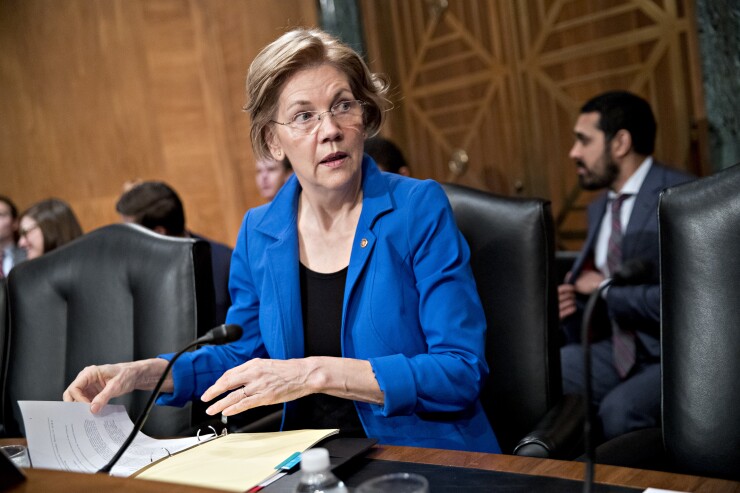
WASHINGTON — Sen. Elizabeth Warren, D-Mass., leaned into her prior criticism of acting Comptroller of the Currency Michael Hsu and the Biden administration for their comments around bank mergers during a Senate Banking Committee hearing Wednesday.
Warren zeroed in on Hsu's approval of JPMorgan Chase's acquisition of First Republic Bank after the California-based institution failed earlier this year. Warren's disapproval of Hsu's handling of bank merger policy is a
"I am extraordinarily concerned about what we have seen in recent months from banking regulators," Warren said. "When First Republic Bank collapsed in April, the bank was ultimately sold to the biggest bank in America, JP Morgan Chase. That sweetheart deal cost the FDIC fund $13 billion. Meanwhile overnight the country's biggest bank got $200 billion bigger. And what happened to the regulator? The acting Comptroller of the currency Michael Hsu rubber-stamped the deal in record time."
Before the bank merger hearing, chaired by Warren, the Senate Banking Committee held an executive session in which it voted to send the nominations of
Warren said that she would "soon"
Unlike the first time Warren introduced that legislation, Warren could find some support for the idea of limiting large bank mergers from the Republican party. While the CFPB provisions might be an obstacle, the bigger picture idea of opposing megabanks purchasing smaller ones received support from Sen. J.D. Vance, R-Ohio, who introduced an amendment that would
Warren also criticized Treasury Secretary Janet Yellen's recent comments that regulators would be open to more mergers in the wake of the bank failure turmoil from earlier this year.
"The overall picture is even worse," Warren said. "Instead of inattentive regulators who don't use their tools to block increasing consolidation, leaders within the Biden administration seem to be inviting more mergers."
Hsu earlier this week
"These comments are stunningly wrongheaded," Warren said. "They indicate that key banking regulators have learned exactly the wrong lessons from the bank regulators this year and from the 2008 financial crash before it."






